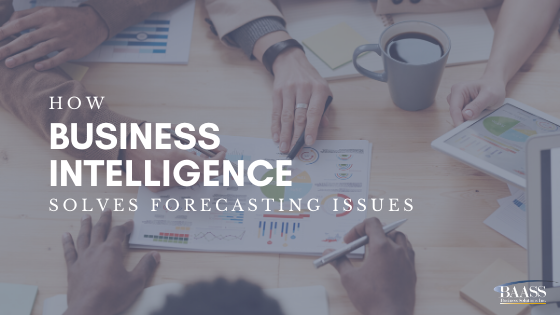Your business intelligence system can be used to improve forecasting. Forecasting can be tricky in almost all industries. Changing business conditions, economic uncertainty, and shifts in supply and demand can make accurate forecasting more guesswork than science. However, with the data derived from your business intelligence system, you can forecast with greater accuracy and precision.
Blog: What is Business Intelligence?
Answering the Three Big Business Questions
Forecasting involves three big questions:
- What are you selling?
- Who are you selling it to?
- When will you close the sale and take the order?
Without a business intelligence system, your forecasting abilities may be hampered by missing or incomplete data. Guessing isn’t going to work when it comes to an accurate forecast. You need comprehensive and timely information.
Business Intelligence Systems Provide Better Data for Forecasting
A business intelligence system offers an effective way of acquiring the data that you need for better forecasting. With better forecasting comes a more efficient, productive, and cost-effective business.
Accurate and immediate answers to these questions help everyone throughout your company do a better job. Procurement can order the right amount of raw materials; production can gear up to produce the best estimate of what is needed. Sales and marketing can use this data to target customers and industries more effectively by trying to sell more of what’s already selling well. Even accounting and finance can do a better job by assessing the company’s current financial state compared to anticipated revenue from future quarters.
Most companies can easily access transactional data. It may exist in spreadsheets or disparate files scattered throughout the company, but it exists. The challenge is merging various files, eliminating duplicate entries, and ensuring accuracy. If you don’t complete all those steps, you’ll spend hours working with spreadsheets, time that could be better spent on other tasks.
Business intelligence systems automatically amalgamate data from various departments into a series of reports that you can run from a central dashboard. The information obtained from your BI system is accurate, timely, and reflective of all activities tracked within your organization.
This puts the power of forecasting into your hands based on trends you’re seeing live on the dashboard. Forecasting tools in BI systems can also help you anticipate shifts in customer demand. Using this data, you can improve inventory management, warehousing, and distribution, sales, and marketing.
Improve Forecasting and Make Better Business Decisions Using BI
A business intelligence system can’t do everything, of course. But when it comes to improving your ability to forecast sales and demand, it’s one of the best steps to improve your business. For more information check out this free whitepaper by Sage called "Get the Insight You Need Using the Tools You Know."
Interested in a Business Intelligence Solution? Check out our buyer's guide.
BAASS Business Solutions
BAASS Business Solutions offers business intelligence solutions including Sage Intelligence, Sage Enterprise Intelligence, BI 360 (Solver), and BI Tools developed by BAASS. Please contact us for a consultation today. Contact us or call 1-888-650-5544.
Looking to Implement a BI Solution?


